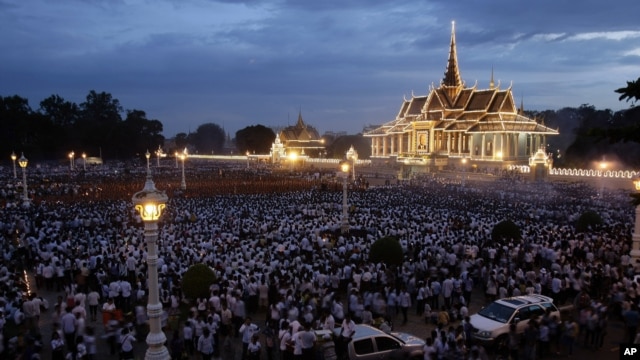09 February 2013
WASHINGTON — The outpouring of grief at
the funeral and cremation ceremonies for the last king Norodom Sihanouk
are proof that the monarchy remains relevant to many Cambodians, a
leading analyst says.
Many tens of thousands of mourners have come to the capital to grieve for Sihanouk, who died in Beijing in October. His body was cremated on Monday, and ceremonies have been held throughout the week.
Many mourners came to the capital despite severe restrictions on their participation, Lao Monghay, an independent political analyst, told “Hello VOA” Thursday. That support comes in spite of the monarchy’s current inability to exercise all its power, he said.
Many tens of thousands of mourners have come to the capital to grieve for Sihanouk, who died in Beijing in October. His body was cremated on Monday, and ceremonies have been held throughout the week.
Many mourners came to the capital despite severe restrictions on their participation, Lao Monghay, an independent political analyst, told “Hello VOA” Thursday. That support comes in spite of the monarchy’s current inability to exercise all its power, he said.
Sihanouk was a known political figure, one who led Cambodia through its
independence and was a leader during its post-Khmer Rouge years and the
civil strife that followed. He was generally loved or respected by most
Cambodians, despite his early support for the Khmer Rouge guerrillas as
they came to power.
After the Paris Peace Accords, signed in 1991 after talks in which Sihanouk was a key player, Cambodia became a constitutional monarchy. But the role of the Royal Palace has since receded into the political background of the country, Lao Monghay said.
People often seek the help of the throne, held now by Sihanouk’s son, King Norodom Sihamoni, for help on social justice, human rights abuses, improper imprisonment and other issues, Lao Monghay said.
After the Paris Peace Accords, signed in 1991 after talks in which Sihanouk was a key player, Cambodia became a constitutional monarchy. But the role of the Royal Palace has since receded into the political background of the country, Lao Monghay said.
People often seek the help of the throne, held now by Sihanouk’s son, King Norodom Sihamoni, for help on social justice, human rights abuses, improper imprisonment and other issues, Lao Monghay said.
“But it is like the kings cannot intervene on anything, or review any proposals in a positive way,” he said of the current political climate. “This is not their mistake. It’s because the authorities don’t help them fulfill their role.”
For example, new laws now put a commission in control of who should be pardoned by the king, which is counter to the intent of the constitution, he said.
“There is no need to have anyone provide additional protection or support [for pardons],” he said. “They simply have to respect what is in the constitution on the role of the king.”
In another example, the king is supposed to be the commander of the Royal Cambodian Armed Forces, he said. This has never been granted.
“Have the king or the King Father ever worn military uniforms to review the troops,” he said, referring to the current monarch and to Sihanouk, who was known after his 2004 abdication as King Father. “This is something they should occasionally allow the king to do.”
Neglecting the role of the monarchy in Cambodian society can have negative consequences, limiting the throne’s ability to maintain stability in the country, Lao Monghay said.



No comments:
Post a Comment